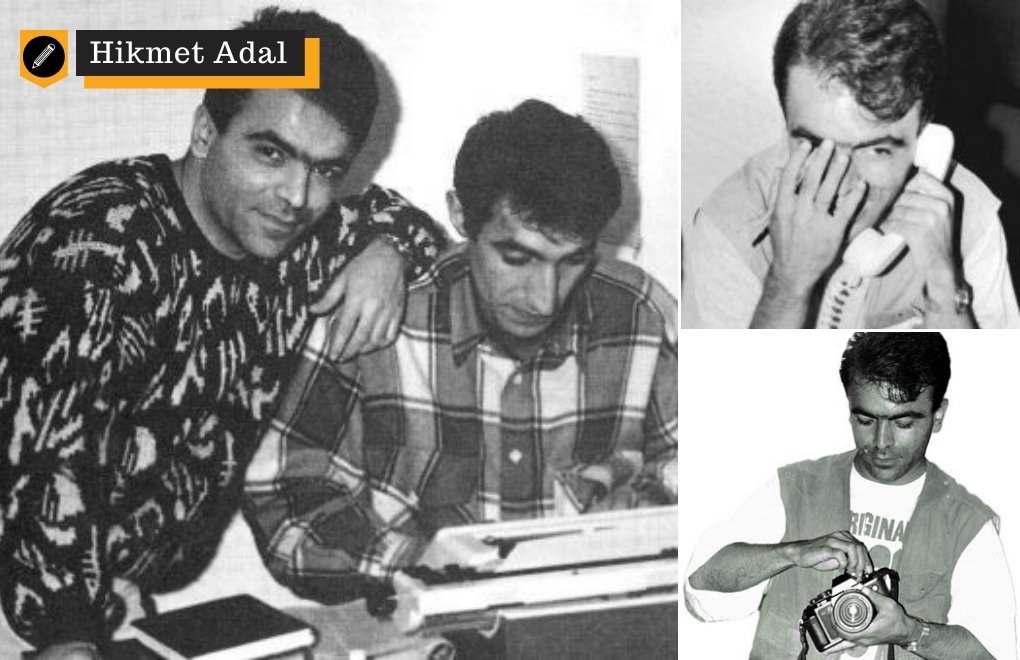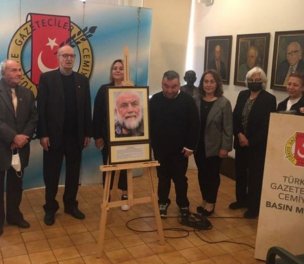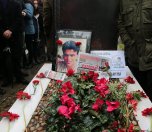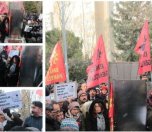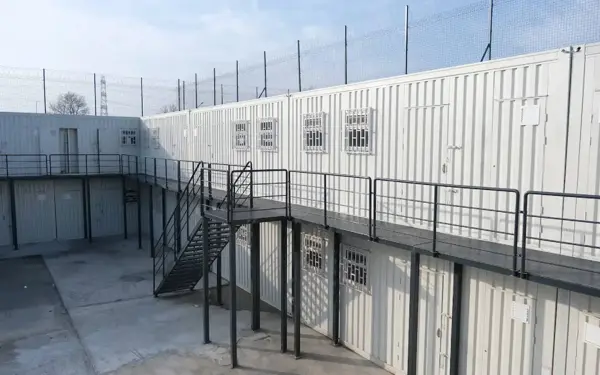Click to read the article in Turkish
They first said, "He fell from a wall," then, "Police don't do such a thing." Some newspapers even reported it as the "suspicious death of the journalist."
He was the journalist who was beaten to death by police despite telling them, "Enough, don't hit me anymore. I lost my sight." Metin Göktepe was a young reporter. He was 28 when he was killed by police officers.
Twenty-five years ago today, he was killed in İstanbul's Alibeyköy, where he had gone to follow the funeral of two prisoners in Ümraniye Prison.
Is there a way to describe these 25 years that have passed? Really, how does the longing feel?
Meryem Göktepe, Metin's elder sister, says, "It is impossible for me, for us, to cool down. Everything is like yesterday."
"I was 30 years old and Metin was 28. There are years we couldn't live, we couldn't mourn," she says, talking about how her pain has increased over the years.
"... I couldn't comprehend how a person would beat a person so deathly like this until I saw Ali İsmail Korkmaz* being beaten in the middle of the street. I mourned for my brother's death after Ali İsmail, I cried my eyes out only after that.
"Because I faced it after that, I said, 'Well, they beat Metin like this as well.' Even more people, with the hatred in them, with more strikes, killed Metin many times. They violently killed my brother. He was my friend, my closest friend.
"You asked me if we have cooled down. It is neither possible for me nor my mother to cool down. Our morning is even reflected on my child, who hadn't been born at the time when Metin was killed, who was born later. It is a mourning that we will have for generations. A brother for whom we couldn't even mourn when we first learned...
"I blacked out when I first learned about it. When I came to myself, there were so many people around me, whom I didn't know, or I knew. Some people say you have to stay strong, police officers are laughing, they enjoy it. You say, 'I have to stay strong.'
"However, I wanted to tear my hair out, to shout, to cry until I got mad. Because my brother was killed."
On that day...
"A friend of Metin's from the high school, Uysal, was working for Özgür Gündem [newspaper]. He called me in the morning on January 9 and wanted to meet with me. I had suspicion inside...
"I met him, he had a friend with him. I asked, 'What happened?' He said, 'Let's go to the newspaper, I'll tell you there.' As soon as we arrived at the newspaper, someone said, 'She is his sister.' At that moment, I said, 'No, this is something else. This is a nightmare and I must wake up.' I stick a pin in my hand to wake up.
Someone said, 'Metin was injured.' My aunt-in-law said he was hospitalized in Çapa. Joy and sadness inside me... At that moment, I thought, 'At least he is alive.' We set out for Çapa.
When we arrived, we were in Cerrahpaşa [hospital]. A crowd... I saw a young girl, she was fluttering on the ground, her friends were trying to get her act together. I later learned that he was Metin's girlfriend.
"I saw my elder brother, İbrahim. I went toward him. I couldn't understand why we were in front of Forensic Medicine. I asked my brother, 'How is Metin?' He is looking at me with his eyes filled with tears. I shook him there, I even punched him. I said, 'Answer me, how is Metin?' 'Understand it,' he said. 'Metin is dead.'
The aftermath
"When I came to myself, we found ourselves in a struggle even before we could mourn his death. At first, they didn't even accept that he was taken into custody. It was said that he was detained but then released. And I found myself waiting for a 'reliable' report to come out of Forensic Medicine.
"When our attorney wanted to attend the autopsy, they said they couldn't take him but take someone from the family. I accepted to attend the autopsy for a reliable report to be written on that day. I said, 'It is enough that this murder is solved.' But they didn't predict such an attempt. They then accepted to take our attorney in.
"I can never forget the expression on the lawyer's face when he got out of the autopsy. Because it was as if he lost himself, he was looking at a fixed point. Then he said, 'This is savagery, how could they do this to a person?' And most importantly, he asked, 'Why was Metin laughing?' My brother's smile was on his face.
When will the heart relieve?
"All of these are in our memory, and fortunately they are. There is no possibility that we forget, our hearts relieve. When Hrant [Dink] was killed, I felt like Metin was killed once again, like that funeral was in our home. Likewise, for those kids in Gezi [2013 protests]...
"Do you know when we will be relieved? When we become a democratic and fair country where the press is free and people live enjoying rights and freedoms, we can say that 'We lost our loved ones, they paid a price but at least justice is served, equality is ensured."
Later...
"The first case was in İstanbul. They moved it to Aydın just before the hearing. One week before that, they raided my home. They took me at midnight when I was alone.
"At the anti-terror department, they made me listen to the voice of a tortured man while I was blindfolded. I will never forget what one of them said to me: 'Listen to this, this is how we killed your brother.'
"For a moment, I was about to lose myself. Then I told myself, 'You must close your ears. This is what they want. I have my child, my mother and my siblings behind. Don't make them have this joy.' This continued until the morning. And in the morning, they let me go, saying that there was a 'mistake.'
"Then we went to Aydın. There were more than three thousand people there. And more than 350 lawyers... Just as many journalists. All of the mainstream newspapers, which didn't cover Metin's death at first, were there.
"I later learned that dissident journalists in the mainstream media protested by dropping their cameras to make them cover this case. Elif Yılmaz, who was working for Kanal 6 at the time, and some other journalists, even left their jobs and came to solidarize with Evrensel [the newspaper Göktepe worked for].
"That was a period in which there was serious solidarity. It was a hopeful time. But when they understood that they couldn't intimidate anyone, they moved the trial to Afyon.
"The trial started in a large sports hall. There was a huge crowd again. But the police officers were never remanded in custody, they weren't standing trial while being arrested. They were even on duty.
"Mehmet Ağar [former interior minister] even said that Metin was 'not a journalist but a terrorist.' It was actually a confession that they would deserve death if he was a terrorist.
"They couldn't say that Metin wasn't killed, they couldn't deny his killing but they were trying to manipulate it.
"This is not the day"
"At that time, President Süleyman Demirel and Interior Minister Teoman Ünüsan apologized to my mother. But my mother said, 'I don't accept your apology. The murderers should stand trial, judge the murderers.' This case proceeded like this. With solidarity, with the public, with people seriously adopting it. Journalists spent serious efforts for the police officers to be remanded in custody.
"For three years in full, people went to and came back from Afyon with buses and the trial ended with a partial gain. The police officers were handed a prison sentence of seven-and-a-half years and awarded by one-and-a-half year jail time.
"If you ask what happened after all these, we are going back to the beginning: whether justice worked or not. At that time, torture was behind closed doors. Now, young people like Ali İsmail, Berkin are killed on the street. Those who said, 'Police don't do that' at the time had to apologize to us after it was proved but now there is an approach like 'It serves him right.' You asked whether I was relieved. Today is not that day...
About Metin GöktepeOn January 8, 1996, Metin Göktepe went to İstanbul's Alibeyköy district, to follow the funerals of four inmates who were killed by soldiers in Ümraniye Prison. He was not let in by the police on the ground that he did not have a press card. He was taken into custody with other hundreds of people and was brought to Eyüp Indoor Sports Hall. While he was being taken into custody, he screamed "I am Metin Göktepe, I am a journalist!" He was beaten to death by police officers while he was in custody. In the beginning, charges against police officers were denied. The case was transferred to several courts in Turkey for "security reasons". In 2000, an Afyon court found 5 police officers guilty for murder and hiding evidence of murder, sentencing them to 7 years and 6 months of prison. Another police officer was sentenced to 20 months in prison and 5 months of license suspension after a court of appeals overturned the court's verdict. After the Conditional Release and Postponement of Sentence Law came into power on December 19, 2000, the convicted police officers were released before completing their sentences. |
(HA/VK)





